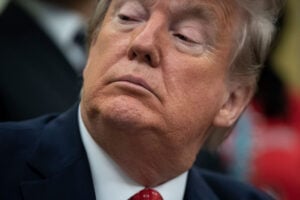[ad_1]

(Photo by Drew Angerer/Getty Images)
It was a weird day in court for Donald Trump. Which is to say, it was a Wednesday, since every courtroom appearance by the famously litigious former president is an occasion for wackassery of one sort or another.
It started with an appearance before Supreme Court Justice Arthur Engoron, in which Trump’s attorney Alina Habba tried to convince the court to abate contempt order finding that her client “willfully disobeyed a lawful order of this court” and should be assessed a $10,000 daily fine until he complies with discovery. The contempt resulted from Habba’s decision to “comply” with a March 3 discovery stipulation with 16 pages of blather restating objections already rejected by the court, plus an affidavit of “compliance” saying that the requested information was in the custody of the Trump Organization, and so Trump bore no responsibility for turning it over.
In a written order today, Justice Engoron agreed to conditionally purge the contempt provided that Trump actually complies — sans scare quotes — with the discovery to the court’s satisfaction by May 20. Habba will have to submit affidavits of compliance that actually accord with New York Law (fourth time’s a charm?), and HaystackID, the e-discovery firm tasked with marshaling documents after the Trump defendants failed to do it themselves, will have to certify that they are actually complying. Trump will have to cut the AG a check for $110,000 to cover the accrued contempt fines, and he’ll have to pay more if he fails to live up to the terms of the order.
This afternoon, four justices from the First Department Appellate Division heard the appeal of Justice Engoron’s order that Trump and his two eldest children sit for testimony. Like the trial court hearing on this issue, it was pretty wild.
Trump’s lawyer Alan Futerfas rested his argument on the theory that it’s somehow illegal for the AG to issue a civil subpoena when there may be a parallel, ongoing criminal investigation by District Attorney Alvin Bragg. A criminal grand jury subpoena in New York comes with an automatic grant of immunity, and Futerfas argued that the civil subpoena is simply a ruse to circumvent criminal process.
After the high profile resignations of the outside attorneys hired by Bragg’s predecessor Cyrus Vance, Jr. to prosecute Trump, it’s pretty clear that there’s nothing left of the criminal investigation. But with Bragg still pinky swearing that the investigation is ongoing even after the grand jury has been disbanded, Futerfas is going to keep flogging this dead horse a little while longer.
The problem with this argument, as the Justices noted, is that civil deponents can assert their Fifth Amendment right against self-incrimination, as Eric Trump did hundreds of times when he was ordered to testify back in 2020.
“You don’t have the right to testify before a grand jury, and no prosecutor worth his salt is going to allow you to testify” Presiding Justice Rolando Acosta said incredulously.
“You’re asking us to eliminate dozens of years of precedent or act as legislators,” he added later. “It’s not like you are unaware of your criminal jeopardy, in which case you can invoke your privilege against self incrimination. That’s the remedy that you have.”
Justice Tanya Kennedy was similarly non-plussed with Futerfas’s premise that a civil investigation which leads to criminal charges is somehow illegitimate.
“What’s wrong with that?” she wondered.
“If that civil investigation creates criminal jeopardy, then it creates criminal jeopardy,” Justice Acosta agreed.
In an attempt to distinguish his case from every other precedent, Futerfas argued that Tish James was biased against his client, and thus her subpoenas were somehow illegitimate.
“We have years of statements by Letitia James,” he said, his voice rising in indignation.
“We have years of statements by everybody,” Justice Acosta responded. And he didn’t need to explain that a guy who ran on a platform of LOCK HER UP is hardly in a position to complain about public statements by an elected official.
“Thank you both for your arguments, they’ve been lengthy and thorough,” Justice Acosta concluded drily.
And just to make the day even better, Justice Engoron rejected a bid by Trump’s appraisers Cushman & Wakefield to let the company re-argue its motion to allow it to quit complying the AG’s subpoenas about how it came up with such wildly varying valuations of Trump’s properties.
“Declined to sign as without any merit,” he wrote. “The [order to show cause] is simply a rehash of issues already properly decided by this court in prior opinion.”
Not exactly a hole in one.
Elizabeth Dye lives in Baltimore where she writes about law and politics.
[ad_2]




